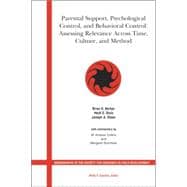
What is included with this book?
Heidi E. Stolz is Assistant Professor of Child and Family Studies at the University of Tennessee. She received her Ph.D. from Brigham Young University in 2002. Her interests include refining research on the parent–child relationship with a special interest in clarifying the effects of mothers and fathers, and in maximizing the utility of research for application in child and family programs and their evaluation. She is fully responsible for Chapters VI and VII of this Monograph in which she introduces, tests, and interprets dominance analysis as an innovative method for analyzing parenting data. She also participated in the writing of Chapter VIII and in editing the full manuscript.
Joseph A. Olsen is Assistant Dean, the College of Family, Home, and Social Sciences at Brigham Young University.He received his Ph.D. from Brigham Young University in 1994. His interests center on the quantitative study of human development, personal relationships, and social interaction, with a particular focus on using structural equation and multilevel models to study small groups and microsocial contexts. He conducted all of the empirical analyses in Chapters IV and Vof this Monograph, he consulted on the analyses reported on in Chapters VI and VII, and he assisted in editing the manuscript.
W. Andrew Collins (Ph.D., Stanford University, 1971) is professor at the Institute of Child Development, University of Minnesota. He has written widely about parent–adolescent relationships and influences during adolescence and peer and romantic relationships during adolescence and early
adulthood. In collaboration with Byron Egeland and L. Alan Sroufe, he is engaged in longitudinal research on social relationships and influences from birth to adulthood. He is a past president of the Society for Research on Adolescence and past secretary of the Society for Research in Child Development.
Margaret Burchinal is the Director of the Design and Statistical Computing Unit at the FPG Child Development Institute and is a Research Professor in the Psychology. She has served as the primary statistician for many educational studies of early childhood, including the 11-state Pre-Kindergarten Evaluation for the National Center for Early Learning and Development,
the longitudinal study of 1300 children in NICHD Study of Early Child Care; the four-state evaluation of child care in the Cost, Quality, and Child Outcomes Study. As an applied methodologist, she has helped to demonstrate that sophisticated methods such as meta-analysis (Burchinal, Peisner-
Feinberg, Bryant, & Clifford, 2000), fixed-effect modeling (NICHD ECCRN & Duncan, 2003), hierarchical linear modeling, piecewise regression (Campbell, Pungello, Miller-Johnson, Burchinal, & Ramey, 2001), and generalized estimating equations provide educational researchers with advanced
techniques to address important educational issues.
| Abstracts | p. vii |
| Introduction | p. 1 |
| The Conceptual Framework | p. 14 |
| U.S Samples and Measures | p. 21 |
| Assessing Relevence AcrossTime: U.S. Analyses and Results | p. 26 |
| Assessing Relevence Across Culture: Cross-National Replications | p. 58 |
| Assessing Relevence Across Method: U.S. Dominence Analysis | p. 73 |
| Assessing Relevence Across Method: Cross-Natioanl Dominance Analyses | p. 96 |
| Discussion | p. 105 |
| References | p. 125 |
| Acknowledgements | p. 137 |
| Commentary- Parsing Parenting Refining Models of Parental Influence During Adolescence | p. 138 |
| A Conversation About Data Presentation | p. 146 |
| Contributors | p. 148 |
| Statement of Editorial Policy | p. 150 |
| Table of Contents provided by Publisher. All Rights Reserved. |
The New copy of this book will include any supplemental materials advertised. Please check the title of the book to determine if it should include any access cards, study guides, lab manuals, CDs, etc.
The Used, Rental and eBook copies of this book are not guaranteed to include any supplemental materials. Typically, only the book itself is included. This is true even if the title states it includes any access cards, study guides, lab manuals, CDs, etc.